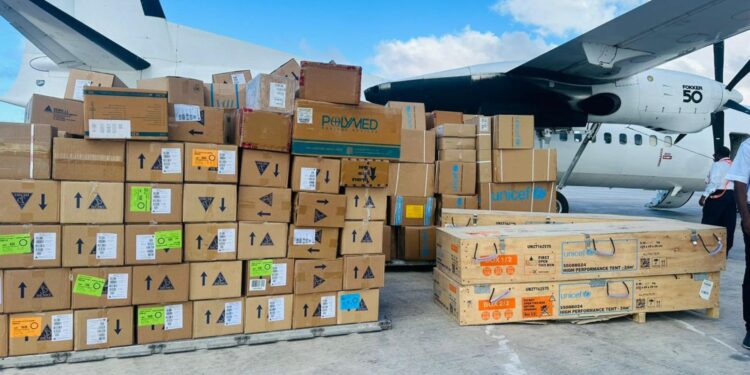(16-04-23) BARDHEERE – The United Nations Children’s Fund (UNICEF) has dispatched 35 metric tons of vital medical equipment, medicines, shelter tents, and nutrition supplies to support the emergency response in the flood-stricken city of Bardheere, located in the Gedo region of Somalia. The announcement was made by Aisha Hummeida, UNICEF Chief of Emergency, who emphasized the importance of immediate action in addressing the humanitarian crisis.
The city of Bardheere has been severely affected by flooding as the Jubba River burst its banks following torrential rain. The rainy season has brought flash floods, inundating approximately 80% of the city and causing widespread devastation. The floods have left thousands of people homeless, destroyed infrastructure, and disrupted essential services, creating an urgent need for humanitarian aid.
UNICEF, in collaboration with partners like the United States Agency for International Development (@USAIDSavesLives), KfW Development Bank (@KfW_int), and the UK’s Foreign, Commonwealth & Development Office (@FCDOGovUK), has stepped in to provide much-needed relief to the people of Bardheere. The 35 metric tons of assistance include medical supplies, such as essential medicines and equipment, to ensure the continuation of healthcare services during this crisis. Shelter tents will provide temporary housing for those who have lost their homes, and nutrition supplies will help address food shortages caused by the floods.
As the rainy season continues, it is crucial that additional support is provided to prevent further loss of life and the spread of waterborne diseases, such as cholera, which can be exacerbated by flooding. UNICEF and its partners are working closely with local authorities to assess the full extent of the damage and to identify the most urgent needs of the affected population.
The ongoing crisis in Bardheere underscores the broader challenges facing Somalia, a country grappling with the consequences of climate change, political instability, and ongoing conflict. International partners and relief organizations continue to work together to alleviate the suffering of affected populations and develop long-term solutions to build resilience against future disasters.











